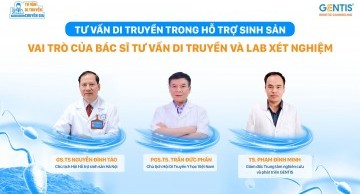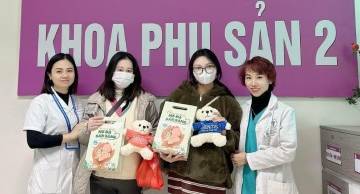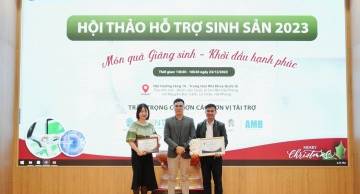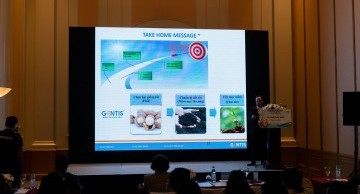-
- 1800 2010
- EN
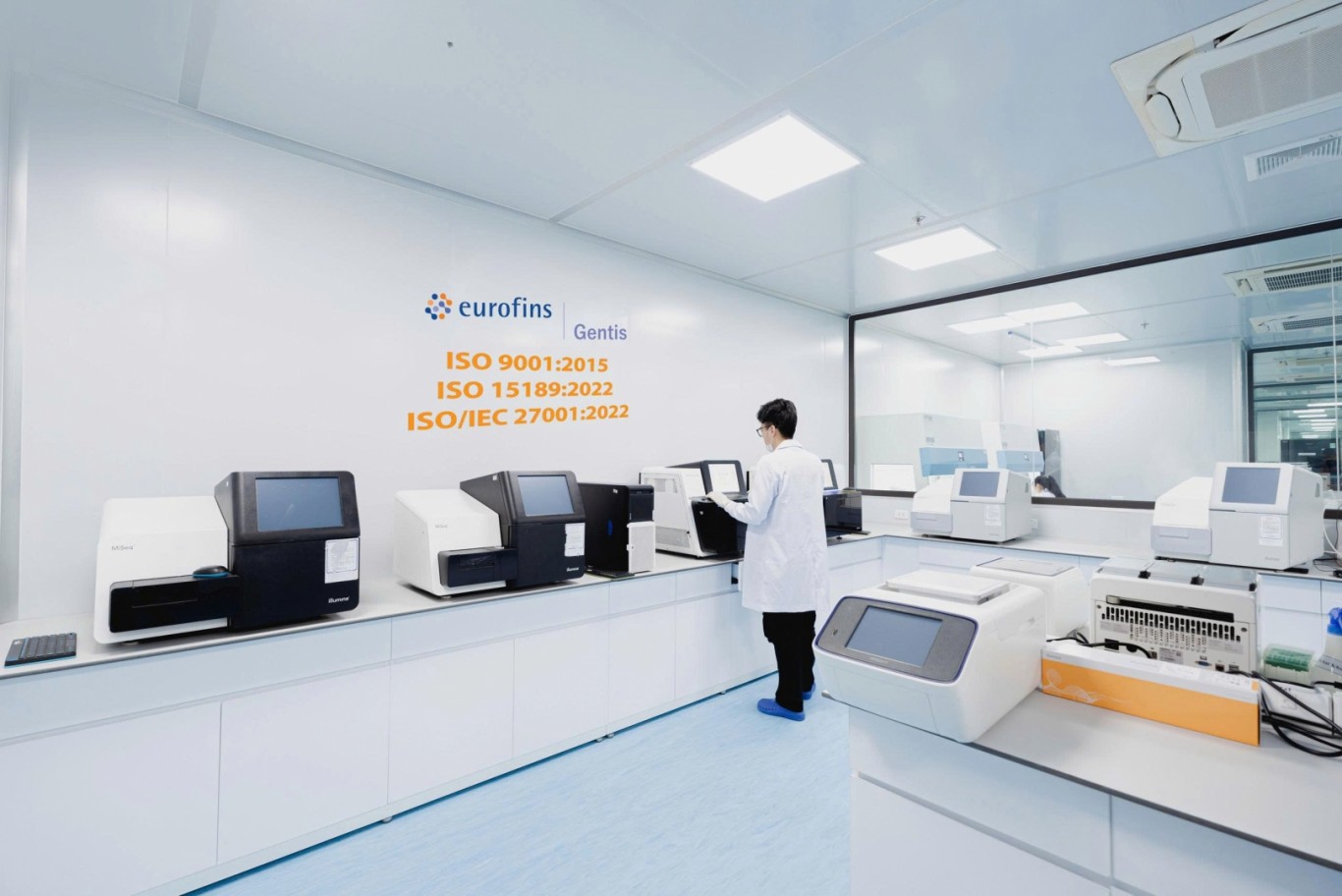
News
Array
(
[0] => stdClass Object
(
[id] => 1179
[id_crawler] =>
[category_product] => NULL
[thumbnail] => dsc01101.jpg
[album] =>
[url_video] =>
[is_status] => 1
[is_featured] => 0
[is_form] => 0
[displayed_time] => 2024-02-05
[program] => 0
[number] => 1
[viewed] => 0
[type] =>
[type_career] =>
[level] =>
[address] =>
[address_career] =>
[expiration_time] => 0000-00-00
[created_time] => 2024-02-05 08:26:41
[updated_time] => 2024-09-04 11:28:56
[files] =>
[salary] =>
[time] =>
[created_by] => 63
[is_table_content] => 1
[language_code] => en
[slug] => Early-screening-of-thalassemia-a-need-for-couples-who-are-both-disease-gene-carriers
[title] => Early screening of Thalassemia - A need for couples who are both disease gene carriers.
[description] => Thalassemia is the most common monogenic genetic disorder today, causing serious consequences for the race, affecting the lives of patients and the whole community. Therefore, thalassemia testing is necessary to detect the disease gene early to help minimize treatment costs and limit the birth of suffered children.
[content] => The "dream-like" happiness of a couple both carrying disease gene
Mr. Huy (1983) and Ms. Doanh (1995) in Soc Son, Hanoi had spent about 7 years looking for their children. It can be said that the journey to find their children is more difficult than other couples because Mr. Phu’s legs were bilaterally paralyzed after an accident, and all personal activities almost depend entirely on others. When visiting the hospital, the doctor advised the family to perform a number of tests to find the cause, and found that both Mr. Phu and Ms. Doanh carried the thalassemia gene (congenital hemolysis).
Moreover, 2 miscarriages, 3 failed embryo transfers created a lot of pressure for him and his wife and the treating doctors. Sad, disappointed, but the desire for children and the love that had been wrapped up for 7 years motivated him and his wife to continue to accompany the Vietnamese-Belgian Hospital of Andrology and Infertility (Vietnam - Belgium IVF).
 The happy small family of Mr. Huy and Ms. Doanh
The happy small family of Mr. Huy and Ms. Doanh
Despite the difficulties, they are still very persistent. Perhaps it was that persistence, perseverance and belief in doctors of the Vietnam - Belgium IVF that created a miracle in the 4th embryo transfer. Baby Minh Dat is the sweet fruit for Mr. Phu and Ms. Doanh's diligent journey to find their children.
However, because economic conditions did not allow it, when doing IVF, they did not perform the preimplantation genetic diagnosis technique. In the case of both husband and wife carrying the thalassemia gene and giving birth naturally, there is a 25% chance that the child will be born with the disease, 50% risk of carrying the disease gene and 25% chance that the healthy child will not carry the disease gene.
With the desire to share, help and support part of the funds to help Mr. Huy's family reduce financial pressure, GENTIS sponsored a thalassemia test to screen Minh Dat early. Fortunately, the results showed that the baby only carried the disease gene.
Receiving the Thalassemia test results, Ms. Doanh choked up emotionally and shared, "My family is grateful and feels very lucky than many people because the baby only carries the disease gene. I wish fathers and mothers who are on the way to find their children will soon pick sweet fruits."
So how is Thalassemia diagnosed?
According to Dr. Ngo Thu Ha (Department of Obstetrics and Infertility of Vietnam Belgium IVF), to diagnose Thalassemia, we should first pay attention to the clinical manifestations and appearance of the patient such as a protruding forehead, flat nose, protruding teeth, enlarged liver, jaundice,... Next, we will do a complete blood count test to check the size of red blood cells. This value is reflected in the mean corpuscular volume index (MCV) and the mean corpuscular hemoglobin (MCH) in your complete blood count test (CBC). If your MCV is <= 85fl and your MCH <=28pg, you are at high risk of carrying a gene mutation that causes thalassemia leading to anemia.
 Dr. Ngo Thu Ha (Department of Obstetrics and Infertility of Vietnam Belgium IVF) examines and consults patients.
Dr. Ngo Thu Ha (Department of Obstetrics and Infertility of Vietnam Belgium IVF) examines and consults patients.
To determine if you have thalassemia, it is necessary to do a hemoglobin electrophoresis test and determine the content of ferritin in the serum, a thalassemia gene test. The implementation of this test will help accurately identify patients with the alpha or beta Thalassemia gene, support doctors in diagnosing and treating the disease effectively, as well as appropriate reproductive advice.
In case the parents are both carriers of the Thalassemia gene, the doctor will advise the patient to do IVF and genetic screening before PGT embryo transfer. This technique helps to select embryos that do not carry disease genes to transfer into the mother's uterus to give birth to healthy babies, contributing to improving the quality of the population.
Currently, GENTIS is accompanying many hospitals and IVF centers to carry out genetic screening before embryo transfer to help many families carrying the disease gene give birth to healthy children. Thalassemia testing at GENTIS uses molecular biology, PCR, and gene sequencing methods to simultaneously identify 21 α-thalassemia and β-thalassemia mutations and rare mutations that cause thalassemia in Vietnamese population. At the same time, homozygous or heterozygous mutant genotypes can be detected.
 Standardized Thalassemia gene testing at GENTIS.
Standardized Thalassemia gene testing at GENTIS.
Notably, the Thalassemia test at GENTIS showed screening results that detected disease genes with 99% accuracy. In particular, GENTIS gathers a team of scientists, experienced consultants in the field of genetics, and a team of professional technicians and consultants. Contact hotline 1800 2010 for the most dedicated advice and testing!
[content_more] =>
[meta_title] => Early screening of Thalassemia - A need for couples who are both disease gene carriers.
[meta_description] => thalassemia testing is necessary to detect the disease gene early to help minimize treatment costs and limit the birth of suffered children
[meta_keyword] => Gentis,thalassemia
[thumbnail_alt] =>
[post_id] => 1179
[category_id] => 4
)
[1] => stdClass Object
(
[id] => 1176
[id_crawler] =>
[category_product] => NULL
[thumbnail] => z5094252485725_aa8c33aca27df2860e8cd2c7c1cd7621.jpg
[album] =>
[url_video] =>
[is_status] => 1
[is_featured] => 0
[is_form] => 0
[displayed_time] => 2024-01-27
[program] => 0
[number] => 1
[viewed] => 0
[type] =>
[type_career] =>
[level] =>
[address] =>
[address_career] =>
[expiration_time] => 0000-00-00
[created_time] => 2024-01-27 13:15:45
[updated_time] => 2024-09-04 11:16:11
[files] =>
[salary] =>
[time] =>
[created_by] => 63
[is_table_content] => 1
[language_code] => en
[slug] => Genetic-counseling-in-assisted-reproductive-technology-with-Prof-Dr-Nguyen-dinh-tao-and-assoc-prof-dr-tran-duc-phan
[title] => Genetic Counseling in Assisted Reproductive Technology with Prof. Dr. Nguyen Dinh Tao and Assoc. Prof. Dr. Tran Duc Phan
[description] => On January 24, the GENTIS Genetic Counseling Center broadcasted the talk show "Genetic Counseling - Discussion with Experts" on the topic of "Genetic Counseling in Assisted Reproductive Technology (ART) - The Role of Genetic Counselors and Testing Labs" on the GENTIS fanpage. The event attracted significant attention from medical professionals working in the field of assisted reproduction, as well as from clients interested in undergoing IVF.
[content] => Led by Prof. Dr. Nguyen Dinh Tao (President of the Hanoi of Society Assisted Reproduction), Assoc. Prof. Dr. Tran Duc Phan (President of the Viet Nam Medical Genetics Association), and Dr. Pham Dinh Minh (Director of R&D and Director of the GENTIS Genetic Counseling Center), the talk show covered genetic knowledge and methods to increase the success rate of in vitro fertilization (IVF) in a straightforward and practical manner, through real-life stories.
Speaking on the significance of the talk show, Prof. Dr. Nguyen Dinh Tao remarked, “In the field of assisted reproduction, there are still many areas that require further research. For couples struggling with infertility, having a child is a deeply held wish, and having a healthy child is a genuine hope, not just for the family but for society as well. To ensure the birth of healthy babies, we must continue to research and understand many aspects, particularly the genetics of the embryo, such as whether the embryo has genetic defects or chromosomal abnormalities. This is where the role of genetic counselors becomes crucial.”
Assoc. Prof. Dr. Tran Duc Phan added, “Today, infertility rates are increasing and tend to affect younger people. Current advancements in genetics are significant; following the sequencing of the human genome, these genetic advancements now help us to conceive and ensure that future children can avoid inheriting certain diseases previously present in the family.”
 The talk show "Genetic Counseling - Discussion with Experts" featured participation from Prof. Dr. Nguyen Dinh Tao, Assoc. Prof. Dr. Tran Duc Phan, and Dr. Pham Dinh Minh.
The talk show "Genetic Counseling - Discussion with Experts" featured participation from Prof. Dr. Nguyen Dinh Tao, Assoc. Prof. Dr. Tran Duc Phan, and Dr. Pham Dinh Minh.
It is clear that genetic testing and counseling play a crucial role in assisted reproduction and healthcare in general. Modern genetic tests have made great strides and are now involved in many stages, including tests related to the parents, the embryo, the embryo transfer process, and newborn screening. The advancement of genome sequencing technology has provided various solutions for detecting genetic diseases, helping doctors to develop the best treatment plans for their patients.
Meanwhile, genetic counseling combines clinical expertise with each patient’s test results, providing information on the likelihood of inherited diseases in future generations of families with such conditions. It also offers advice on marriage, reproduction, and strategies to prevent and reduce negative outcomes in the next generation. This is the core responsibility of genetic doctors: diagnosing and providing genetic counseling.
Dr. Pham Dinh Minh commented, “The 2023 American Society for Reproductive Medicine (ASRM) conference also highlighted that genetics is one of the main drivers of the ART field, not only helping to identify the causes of infertility but also assisting doctors in finding the best treatment methods. With over 13 years of experience in genetic analysis, GENTIS is a pioneer in applying the latest equipment and technology in gene sequencing for testing, as well as in assisted reproduction. GENTIS is committed to researching and developing valuable tests to provide clients with high-quality services. GENTIS operates labs that meet international standards such as ISO 13485:2016, ISO 15189:2012, and aims for CAP accreditation from the U.S. to deliver the best possible testing quality. Additionally, GENTIS has established the Genetic Counseling Center to help clinical doctors and IVF centers accurately and effectively interpret results.”
During the program, the experts addressed the concerns and questions of participants regarding their journey to parenthood using assisted reproductive methods. The extensive knowledge shared by Prof. Dr. Tao, Assoc. Prof. Dr. Phan, and Dr. Minh provided invaluable insights.
It is hoped that the experts’ insights will motivate couples facing infertility on their journey to parenthood. Although the path may be challenging and arduous, with determination, success is possible. Trust that when the time is right, your beloved child will arrive.
[content_more] =>
[meta_title] => Genetic Counseling in Assisted Reproductive Technology with Prof. Dr. Nguyen Dinh Tao and Assoc. Pro
[meta_description] => On January 24, the GENTIS Genetic Counseling Center broadcasted the talk show "Genetic Counseling - Discussion with Experts" on the topic of "Genetic Counseling in Assisted Reproductive Technology (ART)
[meta_keyword] => Gentis,GeneticCounseling
[thumbnail_alt] =>
[post_id] => 1176
[category_id] => 4
)
[2] => stdClass Object
(
[id] => 1175
[id_crawler] =>
[category_product] => NULL
[thumbnail] => z5082492096330_7f0b9df533bd05526a15937b712bb23a.jpg
[album] =>
[url_video] =>
[is_status] => 1
[is_featured] => 0
[is_form] => 0
[displayed_time] => 2024-01-23
[program] => 0
[number] => 1
[viewed] => 0
[type] =>
[type_career] =>
[level] =>
[address] =>
[address_career] =>
[expiration_time] => 0000-00-00
[created_time] => 2024-01-23 08:59:28
[updated_time] => 2024-10-16 15:00:25
[files] =>
[salary] =>
[time] =>
[created_by] => 63
[is_table_content] => 1
[language_code] => en
[slug] => GENTIS-presents-100-gifts-to-expectant-mothers-in-the-Christmas-Celebration-special-gift-program-at-thanh-nhan-hospital
[title] => GENTIS presents 100 gifts to expectant mothers in the "Christmas Celebration - Special Gift" program at Thanh Nhan Hospital
[description] => The "Christmas Celebration - Special Gifts” Program, organized by GENTIS in collaboration with Thanh Nhàn Hospital’s Obstetrics Department 2 from December 22, 2023, to January 22, 2024, was a resounding success. GENTIS was honored to be the main sponsor, offering meaningful gifts to expectant mothers.
[content] => Accordingly, 100 gift packages, each including a cute teddy bear and a special publication, have been handed out by the Obstetrics Department 2 at Thanh Nhan Hospital in collaboration with GENTIS to expectant mothers who registered for examination and newborn screening tests at the hospital. This gift set is a small gift from GENTIS, aiming to help families gradually change their awareness and pay more attention to newborn screening services.
Newborn screening test is a crucial solution for detecting and intervening early in diseases and defects in newborns, helping them develop normally or avoid severe consequences due to congenital defects. Additionally, it reduces the number of disabilities and intellectual impaired individuals in the community, contributing to improved population quality.

GENTIS is currently a leading medical facility specializing in providing reputable testing services. With over 13 years of experience and as a pioneer in the field of medical testing in Vietnam, GENTIS currently offers a wide range of newborn screening test packages tailored to meet the needs of each family. Notably, the newborn screening test packages at GENTIS use specialized techniques to detect newborns at risk of congenital abnormalities, including endocrine, metabolic, and genetic disorders that may not be clinically evident at the newborn stage.
Remarkable, GENTIS EUROFINS Laboratory is equipped with cutting-edge machinery and adheres to international standards ISO 9001:2015 and ISO 15189:2012. Along with this is a team of experienced and highly skilled experts and doctors who are always committed to providing accurate, quick test results and dedicated service.
Following the”Christmas Celebration - Special Gifts” Program at the Obstetrics Department 2 at Thanh Nhan Hospital, GENTIS hopes that families now have a clearer understanding of the importance of newborn screening tests immediately after birth. For more information about newborn screening tests and other GENTIS services, contact us through our hotline: 1800.2010.
[content_more] =>
[meta_title] => GENTIS presents 100 gifts to expectant mothers at Thanh Nhan Hospital
[meta_description] => GENTIS was honored to be the main sponsor, offering meaningful gifts to expectant mothers.
[meta_keyword] => GENTIS,ThanhNhanhostpital,Gift,100
[thumbnail_alt] =>
[post_id] => 1175
[category_id] => 4
)
[3] => stdClass Object
(
[id] => 1172
[id_crawler] =>
[category_product] => NULL
[thumbnail] => z5031918475490_9fd1833cad2b797aaa7bae9402ce3364.jpg
[album] =>
[url_video] =>
[is_status] => 1
[is_featured] => 0
[is_form] => 0
[displayed_time] => 2024-01-09
[program] => 0
[number] => 1
[viewed] => 0
[type] =>
[type_career] =>
[level] =>
[address] =>
[address_career] =>
[expiration_time] => 0000-00-00
[created_time] => 2024-01-09 11:39:35
[updated_time] => 2024-08-28 14:45:21
[files] =>
[salary] =>
[time] =>
[created_by] => 63
[is_table_content] => 1
[language_code] => en
[slug] => Launch-of-GENTIS-Genetic-Counseling-Center
[title] => Launch of GENTIS Genetic Counseling Center
[description] => The Genetic Analysis Services Joint Stock Company (GENTIS) has officially announced and launched the GENTIS Genetic Counseling Center, offering services to individuals and organizations seeking genetic counseling.
[content] => Currently, with new and outstanding advances in gene technology and biology, genetic testing has become faster, more accurate, cheaper, and more accessible to doctors and patients. However, due to the complexity of the pathogenesis of genetic diseases and the specific expertise required for genetic testing, diagnosing, assessing genetic risk, predicting disease outcomes, and making intervention and treatment decisions based on genetic test results are challenging and need to be guided by specialized experts and doctors.
Accordingly, genetic experts and doctors will discuss with patients issues related to genetics, genetic diseases, and genetic testing. This helps patients understand their condition, their genetic disease risk, and that of their family members, as well as the purpose of genetic tests and the meaning of test results. Moreover, experts will provide advice and the most appropriate and effective treatment intervention options for patients.
Recognizing the importance of genetic counseling, the GENTIS Genetic Counseling Center has been officially established. Its purpose is to offer high-quality genetic counseling services to customers. Additionally, the center acts as a bridge between clinical doctors and genetic testing laboratories to meet the healthcare needs of the public. The center also connects leading domestic and international genetic counseling experts and centers in the field of genetics. The goal is to become the leading genetic counseling center in Vietnam and Southeast Asia.
 The GENTIS Genetic Counseling Center gathers a team of reputable and experienced experts in genetics
The GENTIS Genetic Counseling Center gathers a team of reputable and experienced experts in genetics
Notably, the center's professional team consists of top genetic counseling experts and doctors who are deeply trained in medical genetics and have many years of practical experience in genetic counseling and testing. Furthermore, the center expands cooperation with leading international experts, organizations, and centers in the field of genetics, such as Consultagene (Department of Molecular and Human Genetics, Baylor College of Medicine, USA) and Genoma-Eurofins (Rome, Italy), to enhance the quality of genetic counseling and reach regional and global levels.
For each specific case, the GENTIS Genetic Counseling Center will organize direct consultations (or via phone or online) between specialists and customers. The ultimate goal is to help customers understand and address all concerns and choose the best solution for their specific condition.
Additionally, the center organizes online/offline conferences, seminars, and coffee talks to update and exchange genetic counseling knowledge for doctors, healthcare workers, and customers. Furthermore, the center builds a social media forum to connect doctors, healthcare workers, and the public to discuss genetics-related issues.
To receive genetic counseling with experts, please contact the GENTIS Genetic Counseling Center via the hotline: 1800.2010 or visit the 3rd floor, V+ Shopping Center, 505 Minh Khai, Vinh Tuy Ward, Hai Ba Trung District, Hanoi. The center’s professional team will contact you as soon as possible.
[content_more] =>
[meta_title] => Launch of GENTIS Genetic Counseling Center
[meta_description] => The Genetic Analysis Services Joint Stock Company (GENTIS) has officially announced and launched the GENTIS Genetic Counseling Center, offering services to individuals and organizations seeking genetic counseling.
[meta_keyword] => GENTIS,GeneticCounselingCenter
[thumbnail_alt] =>
[post_id] => 1172
[category_id] => 4
)
[4] => stdClass Object
(
[id] => 1168
[id_crawler] =>
[category_product] => NULL
[thumbnail] => chuyen_tru_so_moi/thong_bao_chuyen_tru_so.jpg
[album] =>
[url_video] =>
[is_status] => 1
[is_featured] => 0
[is_form] => 0
[displayed_time] => 2024-01-02
[program] => 0
[number] => 1
[viewed] => 0
[type] =>
[type_career] =>
[level] =>
[address] =>
[address_career] =>
[expiration_time] => 0000-00-00
[created_time] => 2024-01-02 10:45:36
[updated_time] => 2024-09-04 09:35:17
[files] =>
[salary] =>
[time] =>
[created_by] => 63
[is_table_content] => 0
[language_code] => en
[slug] => Gentis-officially-anncouces-the-relocation-of-the-headquarter-to-Minh-Khai-Hanoi
[title] => GENTIS officially announces the relocation of the headquarter to Minh Khai, Hanoi
[description] => Genetic Analysis Services Joint Stock Company (GENTIS) has officially moved its headquarter to the 3rd floor, V+ Commercial Center, No.505 Minh Khai Street, Vinh Tuy Ward, Hai Ba Trung District, Hanoi, effective January 2, 2024.
[content] => Established on October 26th, 2010 by a team of leading scientists in the fields of laboratory testing and biotechnology, GENTIS is proud to be the pioneer within the field of genetic analysis. With an unwavering commitment to development and improvement, GENTIS has reliably maintained its leading position in genetic analysis and clinical diagnostic testing.
Throughout 13 years of operation at HCMCC Tower, No.249A Thuy Khue Street, Tay Ho District, Hanoi, GENTIS has earned the trust of our esteemed partners and customers while establishing a strong reputation and brand both domestically and internationally within the field of genetic analysis.
To accommodate our goal of expanding and modernizing the working environment, as well as provide our customers with enhanced convenience, GENTIS has officially relocated its headquarters to a new, modern facility on the 3rd floor of V+ Commercial Center, No.505 Minh Khai Street, Vinh Tuy Ward, Hai Ba Trung District, Hanoi.
 GENTIS reports its headquarter relocation in Hanoi
GENTIS reports its headquarter relocation in Hanoi
Located in a position with a favorable transportation system, our new headquarters in Hanoi is spacious, modern, and designed to foster growth and innovation of GENTIS in the future. The GENTIS headquarter in Hanoi will officially change its location from January 2nd, 2024. Within the close future, the GENTIS EUROFINS International Laboratory will be opened and operating at this new location.
The opening ceremony for the new headquarter will be held at 15h00 on January 26th, 2024. For all correspondence and transactions, please contact GENTIS by the address: 3rd Floor, V+ Commercial Center, No.505 Minh Khai Street, Vinh Tuy Ward, Hai Ba Trung District, Hanoi.
This headquarter relocation marks an essential milestone in the continuous development journey of GENTIS. If you have any inquiries regarding GENTIS's relocation in Hanoi, please contact our hotline at 1800.2010.
GENTIS is delighted to welcome our valued partners and clients to visit our new headquarter in Minh Khai, Hanoi. We look forward to your ongoing support and partnership. Thank you with sincerity.
Contact Genetic Analysis Services Joint Stock Company (GENTIS)
Hanoi: 3rd Floor, V+ Commercial Center, No.505 Minh Khai Street, Vinh Tuy Ward, Hai Ba Trung District, Hanoi
(Hotline): 1800.2010 - 0988.00.2010
Ho Chi Minh City: No.8/24 Nguyen Dinh Khoi Street, Ward 4, Tan Binh District, Ho Chi Minh City
(Hotline): 1800.2010 - 0888.40.2010
Website: https://gentis.com.vn/
[content_more] =>
[meta_title] => GENTIS officially announces the relocation of the headquarter to Minh Khai, Hanoi
[meta_description] => Genetic Analysis Services Joint Stock Company (GENTIS) has officially moved its headquarter to the 3rd floor, V+ Commercial Center, No.505 Minh Khai Street, Vinh Tuy Ward, Hai Ba Trung District, Hanoi, effective January 2, 2024.
[meta_keyword] => GENTIS,Rellocation,NewHeadquarter,Hanoi
[thumbnail_alt] =>
[post_id] => 1168
[category_id] => 4
)
[5] => stdClass Object
(
[id] => 1167
[id_crawler] =>
[category_product] => NULL
[thumbnail] => dsc05415.jpg
[album] =>
[url_video] =>
[is_status] => 1
[is_featured] => 0
[is_form] => 0
[displayed_time] => 2023-12-26
[program] => 0
[number] => 1
[viewed] => 0
[type] =>
[type_career] =>
[level] =>
[address] =>
[address_career] =>
[expiration_time] => 0000-00-00
[created_time] => 2023-12-26 08:49:01
[updated_time] => 2024-09-04 09:29:49
[files] =>
[salary] =>
[time] =>
[created_by] => 63
[is_table_content] => 1
[language_code] => en
[slug] => Gentis-sponsored-and-presented-at-the-assisted-reproductive-technology-ART-symposium-titlted-a-christmas-gift-a-happy-begining
[title] => GENTIS sponsored and presented at the assisted reproductive technology (ART) symposium titled "A Christmas Gift - A Happy Beginning”.
[description] => The 2023 "A Christmas Gift - A Happy Beginning" Assisted Reproductive Technology (ART) Symposium at Hai Phong International Women's and Children's Hospital officially concluded successfully with the participation of over 100 infertile couples. GENTIS is honored to have been the event’s Diamond Sponsor and presented a scientific paper titled "Karyotype: Applications and Result Interpretation in Assisted Reproduction."
[content] => “A Christmas Gift - A Happy Beginning” is a special event organized exclusively for infertile couples. This occasion served as an opportunity for clients to be updated with insights into assisted reproductive technology (ART) and win exciting prizes to support their journey to parenthood in 2024.
 The "A Christmas Gift - A Happy Beginning" symposium was a resounding success.
The "A Christmas Gift - A Happy Beginning" symposium was a resounding success.
In his opening remarks, Specialist level 1 Nguyen Duc Thuan, MD. (Director of Assisted Reproductive Center at Hai Phong International Women's and Children's Hospital) expressed his understanding of the challenges faced by infertile couples: “Within 10 years of experience in the field of medicine, Dr. Thuan and his team deeply understand the hopes and feelings of couples struggling with infertility. The procedure of treating infertility is a complex journey that requires serious time, effort, and can be emotionally, physically, and financially taxing. Noticing that not all couples have ample time to thoroughly investigate treatment for infertility, HP Fertility organized this symposium.”
At the event, parents listened to Dang Truong Son, MSc. (Head of the IVF HP Fertility Laboratory), Diep Minh Quang, MSc.MD. (IVF FP Fertility) and Nguyen Thi Huyen, MSc.MD. (GENTIS R&D Consultant) sharing proficient knowledge within the field of assisted reproduction. Following the speech, couples acquired knowledge of common causes of infertility and general challenges. Besides, they were introduced to contemporary assisted reproductive techniques that are currently in use.
In addition, experts also provided updates on the latest trends to increase treatment success rates. Moreover, participants also got the chance to get individual advice and consultations with top fertility experts. As an added benefit, participants were eligible for exclusive offers and appealing prizes worth up to 400 million VND.
 Nguyen Thi Huyen, MSc.MD. (GENTIS R&D Consultant) presented the report with the subject “Karyotype: Applications and Result Interpretation in Assisted Reproduction."
Nguyen Thi Huyen, MSc.MD. (GENTIS R&D Consultant) presented the report with the subject “Karyotype: Applications and Result Interpretation in Assisted Reproduction."
The presentation delivered by Ms. Nguyen Thi Huyen, MSc.MD., R&D Consultant at GENTIS, on "Karyotype: Applications and Genetic Counseling in Assisted Reproduction" gained remarkable interest from parents. A karyotype test, according to Ms. Huyen, is a diagnostic workup performed to identify whether a fetus has chromosomal abnormalities linked to genetic disorders. Karyotype testing can be carried out at different stages of pregnancy, including pre-conception, prenatal, and postnatal periods.
Karyotype testing is most commonly used in prenatal care, helping to identify chromosomal conditions that may influence a developing baby. In assisted reproduction, karyotype testing is essential to diagnose genetic causes of infertility, miscarriage, and birth defects, and provide following treatment plans.
For couples with chromosomal abnormalities, there is an increased risk of transmitting these mutations to the fetus, leading to adverse outcomes. Preimplantation genetic testing for aneuploidy (PGT-A) can be a viable option to mitigate these dangers. It is fundamental to experience genetic counseling before and after karyotype testing. Currently, GENTIS offers karyotype testing on three types of samples: peripheral blood, amniotic fluid, and umbilical cord blood.
With the capacity to perform tens of thousands of tests annually and laboratories systems accredited to ISO 9001:2015 and ISO 15189:2012 standards, GENTIS is committed to developing tailor-made genetic technologies to the needs of Vietnamese patients, providing significant benefit in the diagnosis and treatment of diseases, as well as assisted reproduction. GENTIS continues to solidify its leading position in the field of genetic testing, earning the trust of our partners and customers.
 GENTIS was honored to be the Diamond Sponsor of the "A Christmas Gift - A Happy Beginning” symposium.
GENTIS was honored to be the Diamond Sponsor of the "A Christmas Gift - A Happy Beginning” symposium.
Additionally, GENTIS impressed participants with our exhibition booth showcasing advanced diagnostic tests. At the booth, parents were able to learn more about GENTIS's comprehensive range of maternal and neonatal screening tests, including Non-Invasive Prenatal Testing (NIPT) and newborn screening. We extend our congratulations on the successful symposium.
[content_more] =>
[meta_title] => GENTIS sponsored and presented at the assisted reproductive technology (ART) symposium
[meta_description] => GENTIS is honored to have been the event’s Diamond Sponsor and presented a scientific paper titled "Karyotype: Applications and Result Interpretation in Assisted Reproduction."
[meta_keyword] => Gentis
[thumbnail_alt] =>
[post_id] => 1167
[category_id] => 4
)
[6] => stdClass Object
(
[id] => 1166
[id_crawler] =>
[category_product] => NULL
[thumbnail] => web.jpg
[album] =>
[url_video] =>
[is_status] => 1
[is_featured] => 0
[is_form] => 0
[displayed_time] => 2023-12-22
[program] => 0
[number] => 1
[viewed] => 0
[type] =>
[type_career] =>
[level] =>
[address] =>
[address_career] =>
[expiration_time] => 0000-00-00
[created_time] => 2023-12-22 08:56:55
[updated_time] => 2024-09-04 09:25:25
[files] =>
[salary] =>
[time] =>
[created_by] => 63
[is_table_content] => 1
[language_code] => en
[slug] => Gentis-partnered-with-the-program-Gifts-gleaming-christmas-cheer-at-thanh-nhan-hospital
[title] => GENTIS partnered with the program “Gifts gleaming - Christmas cheer” at Thanh Nhan Hospital
[description] => From December 22nd, 2023 to January 22nd, 2024, GENTIS collaborated with Department 2 of Obstetrics and Gynecology - Thanh Nhan Hospital to conduct the program “Gifts gleaming - Christmas cheer”. This program exclusively targeted pregnant mothers when registering for pregnancy consulting and newborn screening at Department 2 of Obstetrics and Gynecology of Thanh Nhan Hospital. GENTIS is honored to be the main sponsor of this program.
[content] => Currently, there has been a significant increase in congenital anomalies in newborns. These conditions can emerge from various factors, including environmental pollution, dietary exposure to chemicals, maternal psychological stress, and genetic predisposition. According to the data of the Ministry of Health, it is estimated that around 1.5 million babies are born each year in Vietnam, with 2-3% of them affected by genetic disorders or congenital mutations including Down syndrome, neural tube defects, and thalassemia.
Thus, newborn screening is considered the most proficient method for early detection of these birth defects. This screening test allows doctors to identify infants at risk for genetic disorders or congenital anomalies, facilitating timely diagnosis and intervention.
Early detection and treatment can not only significantly assist in the child’s normal development, but also diminish the burden on families and society due to the fact that these congenital anomalies or underlying diseases can essentially affect a newborn's physical, mental, and cognitive development, and can even be fatal.

Understanding the significance of newborn screening tests, GENTIS is honored to partner with the Department 2 of Obstetrics and Gynecology - Thanh Nhan Hospital in organizing the event “Gifts gleaming - Christmas cheer”. As a special gift, GENTIS will present an adorable teddy bear and a special product to clients who register for pregnancy consulting and newborn screening at the Department 2 of Obstetrics and Gynecology, Thanh Nhan Hospital. This gift bundle acts as a small token from GENTIS and the hospital to empower families to become more aware of and interested in this service.
As of now, GENTIS is providing an assortment of newborn screening test packages for parents to choose. A distinctive feature of GENTIS's newborn screening packages is the utilization of specialized techniques to identify newborns at risk of having congenital anomalies and disorders related to endocrine, metabolic, and genetic abnormalities that may not present clinically during the neonatal period. GENTIS is committed to continuous improvement to ensure the accuracy and precision of every procedure and result, fulfilling our mission of enhancing the physical and intellectual well-being of the Vietnamese people.
[content_more] =>
[meta_title] => GENTIS partnered with the program “Gifts gleaming - Christmas cheer” at Thanh Nhan Hospital
[meta_description] => From December 22nd, 2023 to January 22nd, 2024, GENTIS collaborated with Department 2 of Obstetrics and Gynecology - Thanh Nhan Hospital to conduct the program “Gifts gleaming - Christmas cheer”
[meta_keyword] => Gentis
[thumbnail_alt] =>
[post_id] => 1166
[category_id] => 4
)
[7] => stdClass Object
(
[id] => 1165
[id_crawler] =>
[category_product] => NULL
[thumbnail] => hasam_2023/gentis-322.jpg
[album] =>
[url_video] =>
[is_status] => 1
[is_featured] => 0
[is_form] => 0
[displayed_time] => 2023-12-13
[program] => 0
[number] => 1
[viewed] => 0
[type] =>
[type_career] =>
[level] =>
[address] =>
[address_career] =>
[expiration_time] => 0000-00-00
[created_time] => 2023-12-13 13:42:00
[updated_time] => 2024-09-04 11:06:09
[files] =>
[salary] =>
[time] =>
[created_by] => 63
[is_table_content] => 0
[language_code] => en
[slug] => Gentis-sponsored-and-reported-at-the-HASAM-2023-Annual-Scientific-conference
[title] => GENTIS sponsored and reported at the HASAM 2023 Annual Scientific Conference
[description] => On December 10, 2023, the Hanoi Society of Assisted Reproduction held the HASAM 2023 Annual Scientific Conference at the Daewoo Hotel in Hanoi. GENTIS was honored to be a Gold Sponsor and presented a scientific report on the topic: "Personalized Treatment of Infertility Based on Gene and Genetic Testing: Current Status and Trends."
[content] => The HASAM 2023 Annual Scientific Conference attracted the attendance of over 300 delegates, including embryology experts, lab directors, clinical doctors, heads of leading Assisted Reproduction centers nationwide, and international assisted reproduction experts. This event provided a platform for delegates to connect, exchange knowledge, learn, and stay updated on clinical and practical aspects of assisted reproduction, including: ovarian stimulation, embryo transfer, infertility treatment based on genetic testing, male infertility solutions, ect.
The main theme of this year's conference was "Updating Outstanding Achievements to Enhance Success Rates in Assisted Reproduction," featuring 26 high-quality scientific reports. A highlight of the conference was the genetics session, co-chaired by Le Thi Lan Phuong, M.Sc., M.D. (Vinmec Hospital) and Pham Dinh Minh, Ph.D. (Director of GENTIS R&D), which included four presentations focusing on embryos, genetics, PGT techniques, andrology testing, etc.
 The HASAM 2023 Annual Scientific Conference took place on December 10, 2023.
The HASAM 2023 Annual Scientific Conference took place on December 10, 2023.
During the discussion session, the report titled "Sexually Transmitted Diseases and Infertility: Clinical Significance of Testing and Treatment Approaches" by Nguyen Ba Hung, M.Sc., M.D. (Vinmec Hospital) garnered significant attention from attendees. According to Doctor Hung, he highlighted that sexually transmitted diseases (STDs) are complex conditions impacting all stages of male and female reproduction (eggs, sperm, embryos, babies,...). Currently, PCR testing for 12 pathogens is the most prevalent NAAT method for detecting and quantifying STI agents. It is considered the gold standard for clinical diagnosis, boasting a sensitivity and specificity exceeding 98%, and can be performed simultaneously for multiple pathogens.
In his presentation, Doctor Hung also included information about GENTIS's STDs combo test for 12 pathogens, utilizing Realtime PCR technology (Caregene). He expressed high praise for GENTIS's STDs testing, recognizing its ability to optimize diagnosis accuracy for doctors and the costs for patients.
 Nguyen Ba Hung, M.Sc., M.D. (Vinmec Hospital) presented a report entitled "Sexually Transmitted Diseases and Infertility: Clinical Significance of Testing and Treatment Approaches."
Nguyen Ba Hung, M.Sc., M.D. (Vinmec Hospital) presented a report entitled "Sexually Transmitted Diseases and Infertility: Clinical Significance of Testing and Treatment Approaches."
A highly debated topic at the conference was the report presented by Specialist level 1 Doctor Nguyen Thanh Trung (Hanoi Hospital of Infertility and Andrology) titled "Clinical Outcomes of Mosaic Embryo Transfers at Hanoi Hospital of Infertility and Andrology." This research, which is part of a collaborative scientific project between the hospital and GENTIS, aimed to assess the clinical outcomes of mosaic embryo transfers, specifically focusing on implantation rates, miscarriage rates, and live birth rates. Doctor Trung, who was directly involved in the project, provided valuable insights for clinicians, suggesting that mosaic embryos with less than 50% mosaicism could be considered for patients lacking euploid embryos. He also emphasized the crucial need for thorough risk assessment and comprehensive counseling for patients undergoing mosaic embryo transfer.
 Specialist level 1 Doctor Nguyen Thanh Trung (Hanoi Infertility and Andrology Hospital) presented research titled "Clinical Outcomes of Mosaic Embryo Transfers at Hanoi Hospital of Infertility and Andrology."
Specialist level 1 Doctor Nguyen Thanh Trung (Hanoi Infertility and Andrology Hospital) presented research titled "Clinical Outcomes of Mosaic Embryo Transfers at Hanoi Hospital of Infertility and Andrology."
Especially, GENTIS was particularly proud that Pham Dinh Minh, Ph.D. (Director of GENTIS R&D Center) was invited to chair and present a report titled "Personalized Treatment of Infertility Based on Gene and Genetic Testing: Current Status and Trends." He considered that gene/genetic testing was becoming prevalent in assisted reproduction and obstetrics in Vietnam. In the future, gene/genetic testing will become more personalized to individual patients, aiding in treatment and proactive healthcare management.
Besides, Dr. Minh also shared insights into GENTIS's testing ecosystem for screening, diagnosis, and personalized treatment in assisted reproduction, including:
- Testing for Parents and Embryos:
- Mother: HPV, Thalassemia, Thrombophilia, Advanced Genetic Screening...
- Father: Andrology testing kit, Karyotype; Advanced Genetic Screening for 150 genes...
- Embryo: PGT-A/SR, PGT-M, PGT-One, PGT-Plus, ASEM Test
- Embryo Transfer Environment Testing:
- Genratest: Personalized embryo transfer timing
- PMTest: Uterine lining microbiome identification
- Maternal and Fetal Health Testing:
Preeclampsia, Antiphospholipid syndrome, NIPT-basic/Geneva, Newborn Screening
 Pham Dinh Minh, Ph.D. (Director of GENTIS R&D Center) presented a report titled "Personalized Treatment of Infertility Based on Gene and Genetic Testing: Current Status and Trends."
Pham Dinh Minh, Ph.D. (Director of GENTIS R&D Center) presented a report titled "Personalized Treatment of Infertility Based on Gene and Genetic Testing: Current Status and Trends."
Proudly partnering as a Gold Sponsor of the HASAM 2023 Annual Scientific Conference, GENTIS impressed attendees with its product showcase booth and engaging activities. Many conference participants checked in at the booth to receive a complimentary copy of the book "Male Infertility Through the Lens of Genetics." The event also featured a mini-game with numerous gifts as a token of appreciation for the esteemed doctors in the Conference.
 The GENTIS product exhibition booth drew significant attention from numerous attendees with its many engaging activities.
The GENTIS product exhibition booth drew significant attention from numerous attendees with its many engaging activities.
These were some of the highlights of GENTIS's participation in the HASAM 2023 Annual Scientific Conference. Through this year's conference, GENTIS hoped to bring its comprehensive gene testing ecosystem closer to doctors, experts, and healthcare professionals in Vietnam. Congratulations once again on the resounding success of the conference.
[content_more] => [meta_title] => GENTIS sponsored and reported at the HASAM 2023 Annual Scientific Conference [meta_description] => On December 10, 2023, the Hanoi Society of Assisted Reproduction held the HASAM 2023 Annual Scientific Conference at the Daewoo Hotel in Hanoi [meta_keyword] => AssistedReproducted,Gentis,HASAM2023,Conference,Symposium [thumbnail_alt] => [post_id] => 1165 [category_id] => 4 ) )Early screening of Thalassemia - A need for couples who are both disease gene carriers.
Genetic Counseling in Assisted Reproductive Technology with Prof. Dr. Nguyen Dinh Tao and Assoc. Prof. Dr. Tran Duc Phan
GENTIS presents 100 gifts to expectant mothers in the "Christmas Celebration - Special Gift" program at Thanh Nhan Hospital
Launch of GENTIS Genetic Counseling Center
GENTIS officially announces the relocation of the headquarter to Minh Khai, Hanoi
GENTIS sponsored and presented at the assisted reproductive technology (ART) symposium titled "A Christmas Gift - A Happy Beginning”.
GENTIS partnered with the program “Gifts gleaming - Christmas cheer” at Thanh Nhan Hospital
GENTIS sponsored and reported at the HASAM 2023 Annual Scientific Conference
Please fill in the information below to receive our supports and consultations!
Please fill in the information below to receive our supports and consultations!


